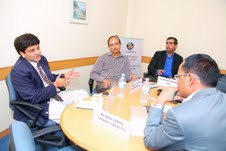Venue—India Habitat Centre
Moderator—Ravi Sinha, CEO & Managing Editor, Track2Realty
Panelists—Sachin Sandhir, MD, South Asia, RICS
Achal Agarwal, ED, Investments, Fire Capital
Sunil Dahiya, MD, Vigneshwara Developers
J C Khera, GM, Finance, Supertech
 Sachin Sandhir: There is a fundamental point in land acquisition modality itself. What is the basis on which the market value is being derived? Don’t you think we should figure out land reforms first, digitizing the land records, getting the market values right is more important? There is a fundamental disconnect. By 2013, India is going to be adopting IFRS. And the convergence of accounting standards across the world is happening because it is not a matter of choice. There is a global agreement between IASB and IVSC that whenever an asset is valued under IFRS, it has to be valued on the basis of IVSC standards. All asset will need to comply with those IVSC standards. And effectively that means that the RICS Red Book becomes the standard and what that further means is that if you are imposing a system wherein you are arbitrarily arriving at a market value, then that is against the fundamental principles under which IFRS will work.
Sachin Sandhir: There is a fundamental point in land acquisition modality itself. What is the basis on which the market value is being derived? Don’t you think we should figure out land reforms first, digitizing the land records, getting the market values right is more important? There is a fundamental disconnect. By 2013, India is going to be adopting IFRS. And the convergence of accounting standards across the world is happening because it is not a matter of choice. There is a global agreement between IASB and IVSC that whenever an asset is valued under IFRS, it has to be valued on the basis of IVSC standards. All asset will need to comply with those IVSC standards. And effectively that means that the RICS Red Book becomes the standard and what that further means is that if you are imposing a system wherein you are arbitrarily arriving at a market value, then that is against the fundamental principles under which IFRS will work.
Sunil Dahiya: I agree with you in a big way. That is why I said that before regulating, we should focus on reform. We have come through the reforms on our own effort; developers have made the standards. The policy has not brought the standard. But have we got the reforms in place where we would have got an even better framework for providing better competitive products. I think we all agree here that with that sort of impetus we will be able to provide better housing to the consumer.
Achal Agarwal: I would like to say when you compare other sectors with real estate, there is an entry barrier in say, auto industry. There you don’t get to see that anyone can start manufacturing cars or something else. It is the maturity level of an industry which governs whether it should be more regulated or less regulated.
Ravi Sinha: Are you suggesting entry barrier into real estate?
Achal Agarwal: No.
Sachin Sandhir: The disconnect is separate. We need to reduce that, the building approval processes and reduce the time taken in project completions.
Sunil Dahiya: You are talking from the consumer redressal point. But the point here is the confusion created by the Government. We are already highly regulated. You need regulation for unauthorized development. And for that you already have regulation guidelines and enforcement department in township planning.
Sachin Sandhir: Looking at it from purely data perspective. A builder like DLF delivers about 2000 apartments a year. An average mid size developer delivers about 500 apartments a year. Let’s look at the time from where the buyer buys a house. There is a sufficient time when you have got your 25 per cent and the buyer has nothing and he can not do anything and can not even get an answer to what is going on. That is why I think redressal mechanism is much more important.
Sunil Dahiya: That is where I was coming to. Today, there is no act in the Indian law that I can recover my payment from the consumer. There are hundreds of laws in the hands of the consumers that are used to penalize the developer. So the regulation has to come from both sides. And I agree with you on the point that the life cycle of a project is not less than 7 years. 4 years of construction and the rest is spent in getting approvals.
Sachin Sandhir: But what is the promise to the buyer?
Sunil Dahiya: 24 months.
Sachin Sandhir: That’s right. The pre-sale promise is of 24-36 month. Even if I take it as 48 months, I would be wrong. I won’t get anything for at least 8 years.
……to be continued






1 Comment
A interesting debate….
i m agree with many points of Sunil Dahiya.
like’ there is no act in the Indian law that I can recover my payment from the consumer. There are hundreds of laws in the hands of the consumers that are used to penalize the developer.’